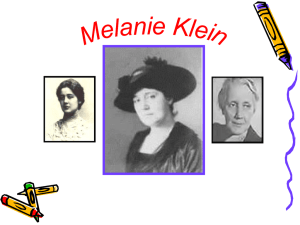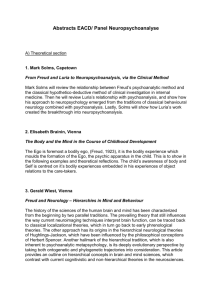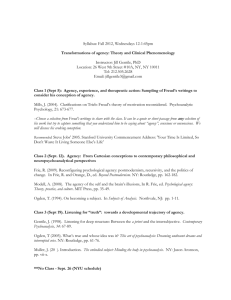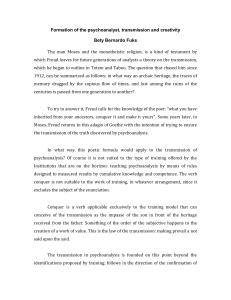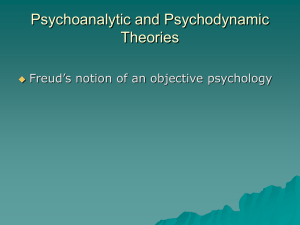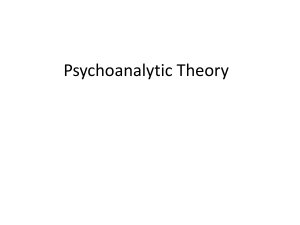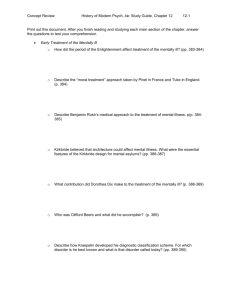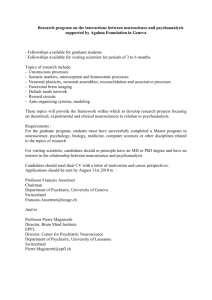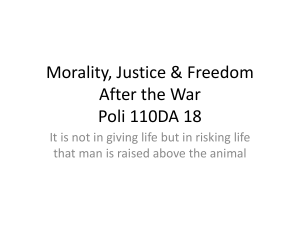Sigmund Freud, whose background was in medicine and
advertisement
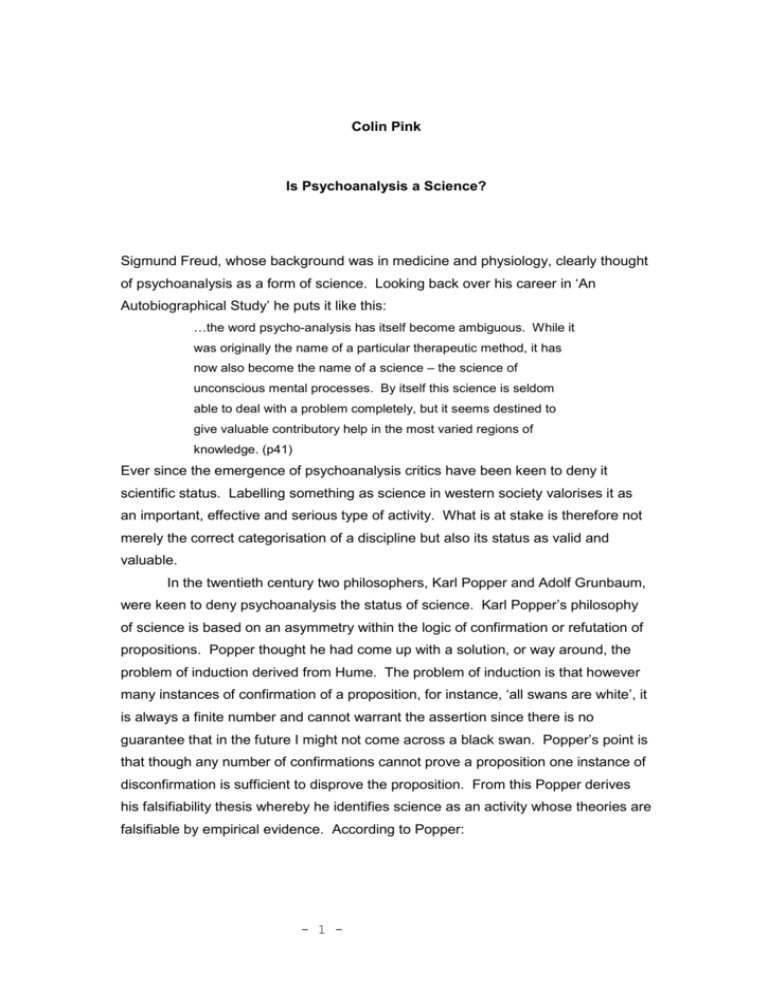
Colin Pink Is Psychoanalysis a Science? Sigmund Freud, whose background was in medicine and physiology, clearly thought of psychoanalysis as a form of science. Looking back over his career in ‘An Autobiographical Study’ he puts it like this: …the word psycho-analysis has itself become ambiguous. While it was originally the name of a particular therapeutic method, it has now also become the name of a science – the science of unconscious mental processes. By itself this science is seldom able to deal with a problem completely, but it seems destined to give valuable contributory help in the most varied regions of knowledge. (p41) Ever since the emergence of psychoanalysis critics have been keen to deny it scientific status. Labelling something as science in western society valorises it as an important, effective and serious type of activity. What is at stake is therefore not merely the correct categorisation of a discipline but also its status as valid and valuable. In the twentieth century two philosophers, Karl Popper and Adolf Grunbaum, were keen to deny psychoanalysis the status of science. Karl Popper’s philosophy of science is based on an asymmetry within the logic of confirmation or refutation of propositions. Popper thought he had come up with a solution, or way around, the problem of induction derived from Hume. The problem of induction is that however many instances of confirmation of a proposition, for instance, ‘all swans are white’, it is always a finite number and cannot warrant the assertion since there is no guarantee that in the future I might not come across a black swan. Popper’s point is that though any number of confirmations cannot prove a proposition one instance of disconfirmation is sufficient to disprove the proposition. From this Popper derives his falsifiability thesis whereby he identifies science as an activity whose theories are falsifiable by empirical evidence. According to Popper: - 1 - 1 A theory which is not refutable by any conceivable event is nonscientific. Irrefutability is not a virtue of a theory (as people often think) but a vice… Every genuine test of a theory is an attempt to falsify it, or to refute it. Testability is falsifiability; but there are degrees of testability: some theories are more testable, more exposed to refutation, than others; they take, as it were, greater risks. According to this model scientists are constantly testing their theories against evidence provided by observation and experimentation. In denying psychoanalysis the status of science Popper claims that pyschoanalysis is not falsifiable in this way. Indeed, he claims that its very persuasive quality, that it can appear to explain everything, is itself an indication of its unscientific character. Popper points out that through the use of psychoanalytic ideas such as repression, displacement, resistance, negation and sublimation any example that could be used to refute the theory can be turned around into a proof of one or another of the elements of the theory. Thus, according to psychoanalytic theory, the more I deny something was the case the more likely it is that it was the case but I am unable to come to terms with it and therefore seek to suppress it through my vehement denials. However, it is highly unlikely that, according to Popper’s own criteria of falsifiability, there is any activity that truly warrants the label science. In practice scientists simply do not behave in the way that Popper specifies, valiantly trying to prove their theories wrong. On the contrary most scientific work is done in order to try and obtain confirmation of theories, anomalous data is often explained away through subsidiary theories or faulty data rather than taken as refutations just in the way that Popper attributes to psychoanalysis. All theories, according to a strict interpretation of Popper, are false since there is always data that cannot be explained by the theory. However, if the theory is successful in explaining other things it will not be discarded until another theory can replace it that is capable of explaining both the things that the old theory covered and the anomalies; but this theory too will encounter data that cannot easily be explained according to the theory. Thomas Kuhn’s historically informed philosophy of science, as developed in The Structure of Scientific Revolutions, adopts a model that is much more closely - 2 - 2 based on the actual practice of scientists now and in the past. According to Kuhn’s model there are periods of normal science where piecemeal work is undertaken within the paradigm of a dominant overall theory, e.g. Newtonian mechanics. Over time, while working within the paradigm, various anomalies are identified which it cannot explain. At a certain point a crisis evolves where the weight of anomalies becomes troublesome and this leads to a period is instability where various imaginative alternatives to the dominant paradigm are explored in a search for a new paradigm. The adoption of a new paradigm e.g. Einstein’s theory of relativity initiates a revolution in the field and replaces the old paradigm. A new period of normal science can then commence under the new paradigm. According to Kuhn science develops over time through this cyclic process of normal science, crisis, revolution and a return of normal science. Major changes in scientific theories are therefore paradigm shifts and result in not only a new theory but also a new set of problems. Adolf Grunbaum’s critique of psychoanalysis, in his Foundations of Psychoanalysis, is more sophisticated than Popper’s approach. He denies that Popper is right in claiming that psychoanalysis is unfalsifiable. According to Grunbaum psychoanalysis is a discipline whose aims are scientific and whose claims can be assessed by empirical evidence but that the evidence points to the fact that it is unable to meet the standards of a science. Freud’s psychoanalytic theories rest on the clinical evidence provided by the psychotherapeutic practice of Freud and his followers but according to Grunbaum this evidence is hopelessly contaminated by ‘suggestions’ from the analyst which affect the behaviour of the patient. Grunbaum challenges the status of evidence that is said to support psychoanalytic theory. In order for psychotherapy to be effective the analyst must provide an interpretation that is recognised as valid by the analysand, this is called by Grunbaum the tally argument because the pyschoanalytic interpretation must tally with what is real for the patient to acknowledge it and find it effective in improving his/her condition. As Freud himself pointed out the success of an interpretation during analysis depends on its acceptance by the analysand. - 3 - 3 Grunbaum’s main argument hinges on the question of the contamination of the evidence. In scientific research experimental evidence is invalidated if the data is contaminated by extraneous material. As Chalmers puts it: Experiments are adequate, and interpretable as displaying or measuring what they are intended to display or measure, only if the experimental set-up is appropriate and disturbing factors have been eliminated. (p31) Grunbaum maintains that because the evidence for an analysand’s experiences is derived from the clinical situation it is hopelessly contaminated by the psychological influence of the analyst and therefore cannot have any objective status as evidence. Psychoanalysis itself, through the important notions of transference and countertransference, stresses the ways in which the relationship between the analyst and analysand comes into play in crucial ways during the analysis. According to Grunbaum’s argument psychoanalytical ‘facts’ cannot tally with reality because they are not independent of the investigators who themselves influence what is presented as the facts. Grunbaum’s criticism of pyschoanalysis assumes that there is normally in science an unproblematic relationship between theory and facts. This positivist naivety regarding the inter-relationship between theory and evidence weakens Grunbaum’s case against psychoanalysis being a science. There are no theory independent facts that can be called up in the evaluation of a theory since what counts as the relevant facts is itself dependent on the theory or paradigm under which the activity is undertaken. The facts and what counts as the facts are constructed by the theoretical framework within which they are assessed. Once again scientific activity in general, and not just psychoanalysis, would seem to be guilty of the charge of contamination that Grunbaum wishes to bring against it. A more recent approach to philosophy of science, derived from Kuhn’s sociological approach to understanding the nature of scientific practice, is to regard a science as a type of craft. A craft can be defined as an activity based on a high level of practical skill, acquired over a long period of training and instruction by an experienced practitioner. The members of a craft are institutionalised into its practices through their training. The rigorous training of psychoanalysts would seem to adhere to similar craft values as the training of scientists in other fields such as physics, biology, chemistry etc. - 4 - 4 Thinking of science as a craft is useful in stressing the often over-looked importance of practical doing in scientific activity. However if we compare science to a traditional craft, such as carpentry, we can see that one focuses almost exclusively on practical and specific knowledge/ability whereas science is pervaded by theory. Attempts, such as those of Popper and Grunbaum, to deny scientific status to psychoanalysis tend to highlight the problem of defining, with sufficient clarity, what science is in general. This leads on to the broader problem of the meaning of objectivity, the constructed nature of “facts” and the whole postmodern challenge to simple positivistic empirical models of knowledge both in science and the humanities. According to writers, such as Jane Flax, both Freud himself and philosophers of science such as Popper and Grunbaum are both mistaken in wanting to attribute scientific status to psychoanalysis. The desire to do so is an example of scientism, the over-valuation of science in contemporary society whereby the scientific comes to be seen as synonymous with the rational. When people talk in terms of science they also tend to have one particular science, physics, in mind and fail to take account of differences between the various natural sciences, biology, chemistry, physics, let alone between them and other disciplines such as psychoanalysis. Instead of trying to group disparate practices under universalising headings such as ‘science’ a more useful project would be to highlight what it is that gives each practice its own unique character, value and limitations. Within the practice of psychoanalysis the most significant difference between it and other disciplines is that it takes the form of a special type of relationship between a patient (the analysand) and the clinician (the analyst). It is through exploring the nature of this relationship (transference and counter-transference) that the value and limitations of psychoanalysis can be most clearly discerned. Accord to this way of looking at psychoanalysis the relationship between analyst and analysand, far from invalidating it as an activity, as claimed by Grunbaum, is in fact the most distinctive and valuable characteristic of psychoanalytic practice. According to Flax, who is both a philosopher and a practicing psychotherapist: transference love and rational insight are necessary for the patient’s emancipation, but this rational insight is of a very special - 5 - 5 sort. It is necessarily intersubjective and is more like a mutually agreed-upon reading of a text than a solution to a problem in quantum mechanics. . . . Their goal is not “truth” in the empiricist sense of what “really” happened to the patient, but rather understanding which includes a powerful affective and experiential component. The past is lived through in transference; it is not merely grasped intellectually. (p566) Flax goes on to make the important point that psychoanalytic theory contains within itself the ability to deconstruct the positivistic approach to knowledge exemplified by the philosophies of Popper and Grunbaum. Flax suggests that analytic ideas can help to identify the inadequacy of traditional distinctions between reason/emotion, mind/body, self/others. As Flax says, If science and rational (real) knowledge were not confounded, the question of whether or not psychoanalysis “deserves” or does not “deserve” scientific “status” would simply be irrelevant. (Thinking Fragments, p74) As Wittgenstein eloquently put it, We feel that even if all possible scientific questions be answered, the problems of life have still not been touched at all (Tractatus Logico-Philosophicus 6.52) And it is “the problems of life” that psychoanalysis has made its special area of study. Bibliography: A. F. Chalmers, What is this thing called Science? 3rd Ed London, 1999. Jane Flax, ‘Psychoanalysis and the Philosophy of Science: critique or resistance?’ in Journal of Philosophy Vol 78 p561-569, 1981. Jane Flax, Thinking Fragments: Psychoanalysis, Feminism and Postmodernism in the Contemporary West, Berkeley CA, 1990 Sigmund Freud, ‘An Autobiographical Study’ in The Freud Reader, ed Peter Gay, London 1995 Stephen Frosh, For and Against Psychoanalysis, London, 1997 Adolf Grunbaum, Foundations of Psychoanalysis, Berkeley CA, 1984 - 6 - 6 Thomas Kuhn, The Structure of Scientific Revolutions, 2nd Ed, Chicago, 1970. Donald Levy, Freud Among the Philosophers, London, 1996 Karl Popper, Conjectures and Refutations, London, 1963. Ludwig Wittgenstein, Tractatus Logico-Philosophicus, (trans C.K.Ogden) London, 1922 - 7 - 7
